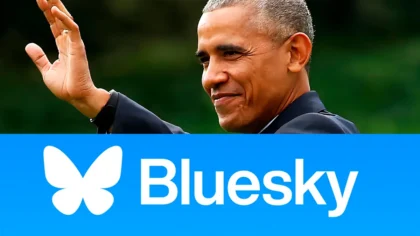Bluesky Rising: Could This Be the New Twitter?
In a symbolic move full of meaning, Obama joins Bluesky, the decentralized social network created as an alternative to the former Twitter, now known as X. The former U.S. president’s presence on the new platform marks another chapter in the quiet migration of public figures toward networks that promise more openness and diversity.
The confirmation came this past weekend when Bluesky’s official profile replied to a user: “Confirmed!” But that’s not all. The former president used his debut on the platform to commemorate the 15th anniversary of the Affordable Care Act, a law that expanded access to healthcare in the U.S. and became widely known as “Obamacare.” With that, he reinforced his usual message: change is possible when we fight for progress.
At first glance, it could have been just another post by Obama. However, the act of joining Bluesky fits into a larger trend. We are witnessing the silent departure of public figures from the digital empires they once helped to define.
The Slow Dissolution of a Monopoly
Since Elon Musk took over Twitter, the platform has gone through major changes. Now known as X, it has lost more than just users — it has lost trust.
With increasingly partisan discourse and controversial decisions around content moderation, X has become a less attractive space. This is especially true for those seeking plurality, meaningful dialogue, or simply a functional social network.
The result has been a gradual exodus, especially among public figures who felt uncomfortable with the platform’s new direction. As a result, Bluesky’s growth accelerated after the 2024 U.S. elections. Today, the platform has surpassed 33 million users.
Alexandria Ocasio-Cortez, a U.S. congresswoman known for her progressive advocacy and strong digital presence, became the first user on the platform to reach one million followers.
What’s Really Changing?
The news that Obama joins Bluesky isn’t just a symbolic gesture of support for a new platform. In truth, it signals something much deeper.
We are witnessing the end of the era when a single social network could dominate the entire conversation.
For a long time, we lived under the assumption that there would always be the social network. Everything revolved around it. But today’s landscape tells a different story.
Decentralized platforms, with more open and transparent proposals, are gaining momentum. And high-profile figures are beginning to signal that shift.
Of course, this doesn’t mean Bluesky will inevitably become “the new Twitter.” However, it does point to something important: no platform will remain sovereign forever. Even the most influential users are now seeking healthier environments — ones with clearer values that better reflect their own.
A New Phase of Social Media?
More than just following Obama or any other public figure, what stands out is how new platforms like Bluesky are gaining traction by offering something different.
Rather than clinging to outdated models, decentralized networks emerge as alternatives that give users more control. They prioritize transparency, a diversity of voices, and greater freedom of choice — values that are becoming increasingly important in today’s digital world.
Perhaps the future of social media isn’t about leaving where we are, but rather about expanding our options. And maybe, rediscovering the joy of connecting in spaces that feel more open, thoughtful, and human.
Keep Exploring
Want more reflections on the future of technology? Check out these as well:
- Bluesky on the Rise: Could It Be the Next Twitter?
- xAI and the revolution of AI-generated videos
- Bluesky on the Rise: Could It Be the Next Twitter?
- Minecraft as an AI Testing Ground: A New Way to Measure Artificial Intelligence
Official Bluesky Website
Posts Recomendados
Carregando recomendações...



